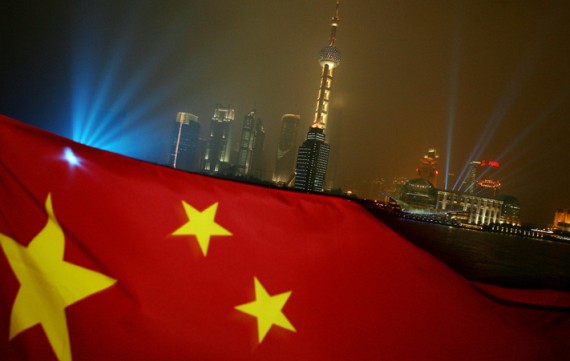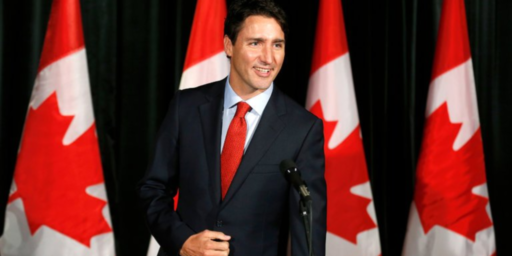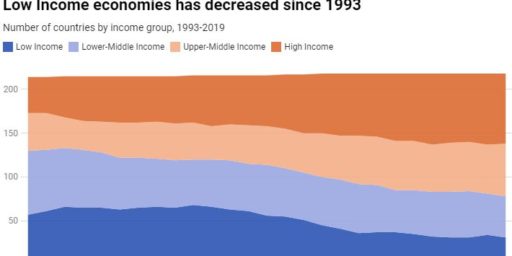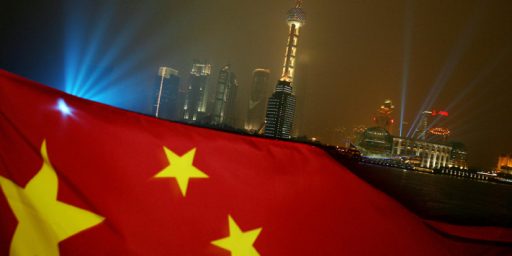Is China Number One?
The USA's 142-year streak as the world's largest economy is ending.
The USA’s 142-year streak as the world’s largest economy is ending, at least according to one somewhat dubious metric.
FT (“China poised to pass US as world’s leading economic power this year“):
The US is on the brink of losing its status as the world’s largest economy, and is likely to slip behind China this year, sooner than widely anticipated, according to the world’s leading statistical agencies.
The US has been the global leader since overtaking the UK in 1872. Most economists previously thought China would pull ahead in 2019.
The figures, compiled by the International Comparison Program hosted by the World Bank, are the most authoritative estimates of what money can buy in different countries and are used by most public and private sector organisations, such as the International Monetary Fund. This is the first time they have been updated since 2005.
After extensive research on the prices of goods and services, the ICP concluded that money goes further in poorer countries than it previously thought, prompting it to increase the relative size of emerging market economies.
The estimates of the real cost of living, known as purchasing power parity or PPPs, are recognised as the best way to compare the size of economies rather than using volatile exchange rates, which rarely reflect the true cost of goods and services: on this measure the IMF put US GDP in 2012 at $16.2tn, and China’s at $8.2tn.
[…]
With the IMF expecting China’s economy to have grown 24 per cent between 2011 and 2014 while the US is expected to expand only 7.6 per cent, China is likely to overtake the US this year.
The figures revolutionise the picture of the world’s economic landscape, boosting the importance of large middle-income countries. India becomes the third-largest economy having previously been in tenth place. The size of its economy almost doubled from 19 per cent of the US in 2005 to 37 per cent in 2011.
Still, Scott Sumner thinks this is a big deal:
1. Yes, there is a big difference between total GDP and GDP per capita. One matters more for things like impact on commodity markets and carbon emissions, the other matters more for the location of industries like Silicon Valley and Wall Street, or military prowess. Germany has a bigger GDP that Switzerland, whereas Switzerland has the higher per capita GDP. Both facts are very important, but in completely different ways.
2. China is neither a big success story nor a big failure. It’s a huge country gradually shifting from catastrophically bad public policy to mediocre policy. It’s a work in progress.
While I hesitate to disagree, I’m skeptical. PPP, and especially PPP per capita, are indeed much more useful measures than exchange rate parity for comparing living standards. If we’re trying to figure out how rich people and countries are, it makes sense to look at what it is they can buy. We understand this domestically, understanding that we can’t directly compare the salaries of people living in Manhattan or San Francisco to those living in Boise or Birmingham without taking into account cost of living.
I’m less sure of the PPP measure’s utility in comparing national power. The world market is mostly numerated in US dollars, making exchange rate figures much more useful for comparing the size of economies.
Tyler Cowen points to Christopher Ingraham‘s WonkBlog piece whose title puts the bottom line up front: “Everybody chill out: China’s economy is still only half the size of ours.”
[T]here’s a reason that standard measures of GDP don’t use the PPP conversion. As the Wall Street Journal’s Tom Wright explains:
China can’t buy missiles and ships and iPhones and German cars in PPP currency. They have to pay at prevailing exchange rates. That’s why exchange rate valuations are seen as more important when comparing the power of nations.
Standard GDP measures take these exchange factors into account. And here, China is doing about as well as one would expect. They’re still the world’s second-largest economy, but their GDP is less than half the size of the U.S. GDP.
Presuming that the World Bank’s recalculation of PPP is accurate—and have no reason to do otherwise—this is good news for China and for mankind. Some 1.2 billion human beings are better off than we thought. But if we’re seeking to rank countries in terms of economic power, it’s not obvious that this new information changes anything.







“American Exceptionalism”
When it went from our goal, and then it became a talking point, we lost.
Now, it’s a tic mark that critics look for when a politician gives a speech.
Much like decline of Rome, no one wants to talk about the problems or stray from their own self interests.
When we don’t educate and care for the young, we ensure the failure of generations to come.
Sorry… No witty banter. Just tired of what we consider important lately.
This metric is no different than the use of test scores to measure a nation’s superiority.
In other words, it’s bloody useless save as a diving board for a thousand pundits’ pet shibboleths.
@Liberal capitalist: @Woody: I’m not sure what either of you are arguing here. Given that they have four times our population, I’ll be thrilled when they pass us in wealth–even double or triple us. In that vein, I think PPP/capita is a very useful metric. I’m just not sure what the point of comparing gross PPP would be.
Honestly, I don’t care as long as median incomes and standards of living are rising here. But that’s the problem. Arguably, neither median incomes nor standards of living are rising.
The direction of policy shouldn’t be ensuring that GDP increases. After all, that could be accomplished by borrowing (or just extending credit), using the money to buy paper, and burning it. Or composting it, if you’re more ecologically-minded.
The direction of policy should be increasing median incomes and standards of living. There’s basic disagreement on how to accomplish that and, sadly, both of the dominant strategies are aimed at increasing GDP rather than standard of living.
Don’t be so sure. The welfare of rich people in poor countries isn’t a particularly good way of measuring overall well-being. There’s some evidence that China’s inequality is growing fast.
There’s also significant evidence that China’s air, water, and land are becoming increasingly poisoned. That affects the quality of life of the poor much more than it does the quality of life of the rich.
as tyler cohen well knows, imported missiles and ships and iPhones and German cars have nothing to do with china’s GDP, which is the output of goods and services produced by labor and property located in China…that’s why using PPP for GDP is an apples to apples comparison
imports are subtracted when GDP is computed because they represent goods not produced in the country who’s real output is being measured…
China at some point is going to have to address it’s massive and fatal pollution problems. When 8 year old children are dying from lung cancer you have a problem. When massive areas of agricultural land can no longer be used because of heavy metal pollution you have a problem.
James, you’re missing the point.
Given China’s population and economic growth, it is only a matter of time before they are the world’s biggest aggregate economy.
This argument about GDP vs. GDP per capita seems to be a dodge. Back in 1872, the UK probably had a higher GDP per capita than the US; we were an agrarian backwater, but the US unarguably still had become the world’s largest economy.
What will be interesting is to see how it all plays out. We have not seen an ascending country overtake the global leader in nearly 150 years. What will that mean?
When a billion people suddenly buy cars and microwaves and eat 5 lbs of meat every week, that will have enormous implications. Concrete, steel, oil, water, coal, aluminum, guns, butter, etc.
When a billion people (or rather two billion when we through in India) become middle class consumers that will have a massive impact on … well, everything.
Given that China has more than four times our population, the real surprise should be that they’re just now passing us. If China has even a mediocre economy, their economy ought to be two or three times the size of ours.
@de stijl:
It is not a dodge at all if one is trying to get a serious comparison of actual economic strength. I say this not to make Americans feel better about being second place on a list somewhere, but as a real issue of comparing relative economic development.
And, of course, one variable is never going to tell the whole story. But if one is going to pick one that tells a better story over another, pick GDP per capita over aggregate GDP.
How much this matters depends on what scenario you envision. If you’re thinking peace, then it’s great news, because we want a relatively well-off China to become a market, and because we want the Chinese people to have decent lives.
If you’re thinking war, that’s a very different matter. If we are in competition with China and anticipating possible armed conflict then we’re losing our biggest advantage. Or at least seeing that advantage whittled down.
Like most sensible folks I’d still rather be playing our hand rather than theirs, but nevertheless we should probably get used to the fact that the world is changing. The European/American civilization does not have quite the edge it once did over the Asian world. Strategically we have the fact that China, Korea and Japan still don’t get along, but if those three evolve to a closer relationship, the balance of the world may shift decisively toward the east.
@michael reynolds:
It seems to me that in a military conflict with China, our biggest advantage is the Pacific Ocean.
@Steven L. Taylor:
Not sure if replacing a list where the US might have just lost first place with a list where the US is either placed 6th, 7th, or 8th is going to make anyone feel better.
But the US is still first in total GDP among countries with a population of 1.34 billion or less and also first in GDP per capita among countries with a population of 6 or 9 million or more!
We’ve been locked into a kind of sterile hubris about being Number One for a long time. If one looks at the GDP numbers only, well, on the basis of population growth, it’s hard to be surprised that this would eventually happen.
Should we worry? Who knows? If we’re not going to look at economic production statistics with consideration of how we are allocating our resources for quality of life for the American people – for education, health, public safety, mortality, longevity, and so forth – then we’re wasting a lot of time.
@michael reynolds:
Other than the statements of a few nationalistic generals there isn’t much reason to think that China is preparing to go to war against us. One of the implications of the “One Child Policy” is that those millions of singletons are very, very precious to their parents who expect to be supported by them in their old age.
Although China remains a very undemocratic country the “mandate of heaven” (i.e. the people’s acceptance of the regime’s right to rule) is still important. Consequently, I think the peace scenario is much more likely.
That doesn’t mean that an era of everlasting peace has begun or we should disarm unilaterally. I’ve read articles claiming that war with China was inevitable, not within the next five years but within the next fifty. I don’t think we should lose any sleep over it.
@Steven L. Taylor:
I care less about measuring economic strength than about global economic implications.
I’m not saying that GDP per capita is meaningless of course it has meaning. China has a relatively low GDP per capita but a very large aggregate economy requires a certain level of infrastructure. That has global economic implications. Petroleum, steel, concrete, etc.
The aggregate GDP is the aggregate GDP whether a country has a population of one (she’s very, very productive but she’s frugal and requires little infrastructure) or one billion.
China will very shortly become the world’s largest aggregate economy and with its population size it consumes a bunch of stuff. A relatively poor populace with a relatively low GDP per capita still consumes a bunch of stuff and requires a lot of infrastructure. Size matters.
Here’s where GDP per capita becomes important – when their living standard and income rises (and it is rising and it will continue to do so) they will consume a whole lot more than a bunch of stuff and the stuff they consume will change.
I could give two hoots where the US or India or China sits on the charts of the “largest” or “strongest” economies (however one measures that).
The economic rise of China and India will be the biggest story of the next century and will have massive implications.
…
Okay, I think I see your point. I was initially saying that large economies matter more than large, wealthy economies, but then I have just argued that large, growing economies will be the prime mover going forward. I may have to concede.
@Dave Schuler:
I see nothing in China’s current behavior to suggest conflict is likely. But rising powers tend to get frisky. They begun to feel they have a right to throw their weight around. See Germany and Japan in the 30’s and the US for much of our history.
How do we respond if China makes a play for Far East hegemony? Or if they cultivate more influence in the ME? Things will be different if we don’t stand astride the international system.
@PJ:
Yes, but I am not concerned about making people feel better, I am concerned about the better comparative metric. GDP per capita tell us more than does aggregate GDP.
@Stormy Dragon:
Really? You’re going with ocean as moat in 2014? It was already nonsense when put forward by the interwar isolationists.
@de stijl: I think you mistake my comments for having much of anything to do with US prestige. That is not my point.
@Steven L. Taylor:
I know you and I both don’t care a whit about US prestige IRT economic rankings. The point I was trying to make was that India and China and the impacts of their growing economies will be the inevitable prime movers of global economics and politics for the foreseeable future.
@de stijl: This is absolutely true, yes.
@michael reynolds:
Maybe I’m a wild-eyed optimist but I think a China where 1.2 billion people have decent lives is less likely to be a threat than one in which 1.19 billion people are having relatively shitty lives and the elite needs a distraction from said shittiness. China is rich enough to buy armaments and be a regional menace regardless; I’d rather them see no advantage in stupid shows of force.
@Dave Schuler: That’s really the question and not one to which I have an answer. Matt Stinson has sent me some anecdotal evidence that the cost of living for the average Chinese is going up without much increase in the quality of life. I’m really hoping that they manage to make this work. The country is urbanizing rapidly and getting richer. They really need to figure out how to ensure that a rising tide lifts some large percentage of the boats. And that most people are in a boat.
@michael reynolds: I am reminded of something Brad deLong once said: Loosely, “The most important political fact of the 20th century was that Americans were trading partners of the English and viewed them as friends. The most important political fact of the 21st century will be whether the Chinese people view Americans as persistent foes or as friends who helped make China prosperous.”
@James Joyner:
Matt’s usually a good resource for that sort of thing and my impression is that he and I have similar instincts.
Eight years ago, when I started writing about this stuff, I woud probably have given China 6 chances out of 10 for pulling off what they really need to. Now I think it’s more like 4 in 10.
@mike shupp:
Fortunately for me I cleverly arranged to have a Chinese daughter. I’m pretty sure that confers honorary Chinese citizenship on me. So me and the PRC are right.
The reason aggregate economy matters is because it is a rough measure of a country’s influence. Look at Taiwan. 30 years ago the Mainland was ‘the enemy’ plain and simple. Today, they are Taiwan’s most important economic driver and Taiwan has an overtly pro-Beijing government. Those of us who are over fifty can appreciate just how momentous a change that is. And that’s based on aggregate economic influence, not per-capita.
@Dave Schuler: just out of curiosity, what has changed?
Basically, failure to address the problems. Problem solution is being deferred until some brighter, presumably richer day. Meanwhile, a “hard landing” for the economy gets more likely with every stimulus package.
@de stijl:
Your point is powerful; even so, there is little in the current economic data relating to either country to show that adding 2 billion people to the middle class from these two countries is going to happen anytime soon. Both countries are doing well and growing their economies, but both, from every metric that I can see, are plagued with the same economic connundrum that our country suffers from–most of the “cream” is rising to the top. This is not the formula that creates a large middle class.
@Dave Schuler: My view on the ground here (I live in Shanghai) is that the Chinese may fail to address all their problems in time, but they are certainly not ignoring them. They are investing heavily in alternative energy, unlike the US which has been incapable in investing in new infrastructure since Reagan and his “government is the problem” mentality. Terrible problems here, and it may overwhelm them, but not for lack of trying.
@Just ‘nutha’ ig’rant cracker: FWIW, India and China just don’t seem to be in the same league. China, for all its problems, builds infrastructure and tackles problems. India just falls further behind.
@MarkedMan:
I find it hard to distinguish between investment and subsidy. When the “investments” go to cronies and don’t result in material gains, I don’t find them particularly productive. That’s as true or truer in China as it is here.
A decade ago China derived about 70% of its energy from coal. Today, as well as anyone can tell, it derives about 70% of its energy from coal. A couple of years back I recall an official pronouncement that China would de-emphasize wind and solar in favor of hydroelectric and nuclear. I don’t know what the status of that is at this point but while hydro is renewable it isn’t green. The methane generation in the ponds behind hydroelectric dams is a substantial source of greenhouse gases.
More than a decade I characterized China’s most serious problems as demography, environmental, and an opaque and corrupt banking system. There hasn’t been much progress on any of those fronts over the intervening period. To some degree there’s been backsliding on its environmental problems and its problems in finance. Gradual progress is a good policy but it’s possible for progress to be just too gradual.
There have been a lot of press releases, though.
@michael reynolds:
That’s true in general, but from the (admittedly little) I’ve read of Chinese history, its never been the case with China. They’ve been the dominant power in their region for long periods over the last couple of thousand years (since the expansion into what they consider China’s natural boundaries), and have never shown much interest in expanding much beyond that.
In fact, much of their attitude seems to have been that there’s nothing but barbarians beyond Chinese borders, and as such most of the world was barely worth dealing with, let alone worth conquering.
@george:
Well, they seem to want those possibly Japanese islands, not to mention Taiwan. In general I think you’re right. But that won’t stop them from doing just what we do – throwing our economic, diplomatic and military weight around in places where a few cases of missiles and a few billion in the right man’s bank account buys you a government. (May they have just as little luck with that as we do.)
@Dave Schuler: Whoever benefited from the investments, they are still there. The Shanghai metro system has to be seen to be believed. Two world class airports and a high speed rail terminal that is every bit their equal. Shipping ports as busy as any in the world. In 1987 the tallest building in Shanghai was the Park Hotel which, at 22 stories, was the tallest building in all of Asia until 1958. By 2008 there were 2000 (2000!) buildings that tall or taller in shanghai and during that time 1/3 of all the tall building construction cranes in the world were in Shanghai. The other large cities in China have similar infrastructure.
Problems? Absolutely. And they might bring them down. But we Americans need to get our act together. Ever since Reagan we’ve invested virtually nothing in new infrastructure and sat back and talked about how the Chinese will come crashing down. 30 years of double digit growth for them, 30 years of doing nothing for us. It doesn’t take a pessimist to worry about where this is going.
@george: the Chinese are definitely in expansionist mode. Not by land but by sea. The Japanese islands get all the attention but there are five other similar disputes with other countries. Connect those six dots and coupled with their 200 mile coastal claim, it carves out a huge piece of the South China Sea. And it could definitely slip into a shooting war.
@MarkedMan:
I can guarantee you that we’ve built a considerable number of new interstates and bridges over the period of the last thirty years. Quite a few cities have installed new light rail systems during that period, too.
We’re in different circumstances than China. Between 1900 and 1960 we built a lot more infrastructure than China did and none of ours was destroyed by war. China’s playing catch-up so their building more makes sense.
We have more than 150 bridges across the Mississippi. Building another one won’t do much for us. By my reckoning every city with population over 100,000 (and most with populations over 50,000) is served by an interstate.
Does our infrastructure need maintenance? Sure. That’s mainly a local issue rather than a national one and cities and states have other spending priorities. I think you’re exaggerating the effect of Reagan a bit.
@Dave Schuler: I absolutely agree that the needs are different. And Shanghai and Beijing have used up all the easy opportunities for say, subway building. It is relatively easy to knock down some three story buildings with overhead wires, dig a trench, drop in a shopping mall, sewage, electricity and subway tracks, and then roof it all over with a modern wide city street. But once the buildings are 10/20/30/40 stories tall you have to tunnel and tunnel deep.
But I can’t think of a single major initiative that the US has achieved in the past 30 years. Sure, we’ve upgraded a few state highways and added them into the Interstate system, but a serious move to energy independence? Clean energy? World Class Internet infrastructure (compare the US system to South Korea’s where, for a reasonable monthly charge you can live stream a baseball game on your phone while in a subway tunnel under a river)? Or anything else? What new infrastructure vision has come out of the US since Reagan? Heck, we can’t even maintain our national parks and the Mall parks looks like a disgrace.